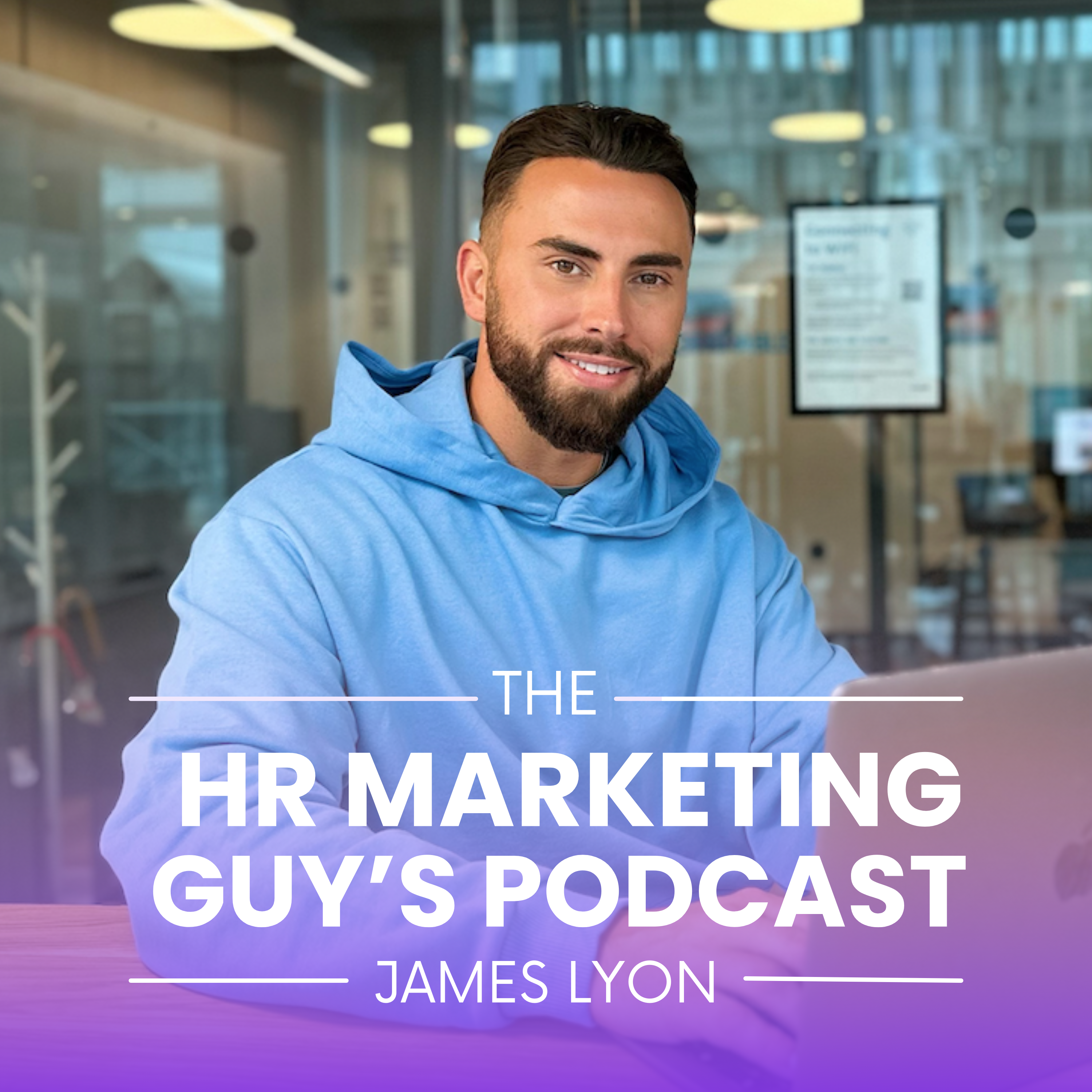Podcast Episode 15: How the jobs to be done framework will help you to be a better business owner

Hello, James here and welcome to this week's podcast.
In this week's main event, I'm going to be talking to you about the jobs to be done framework.
It's transformed the way I work as a business growth and marketing consultant and it will help you to become a better business owner too.
And in this week's though of the week, I'm going to talk to you about why I've finally left the bank Barclays and the big business lesson that it has taught me.
So let's jump straight in.
Transcription below:
Main event:
Let me tell you a story...
If you've followed me for a while, you might know that I'm also the Growth Strategy Director for a much larger marketing company that has over 800 clients worldwide.
Most of which are based in the US.
The business is called MSP Marketing Edge and it's a very similar model to the HR Marketing Box.
We create lots of awesome marketing content for IT Support Providers and we tell them exactly how to use it to generate leads.
And we deliver everything via an online portal.
About 2 years ago, we wanted to redesign our portal to make it easier for our clients to use the content we provided.
We created a brief and we started speaking to a User Experience consultant called Claire.
UX designers focus on strategy whereas UI designers focus on aesthetics.
As a UX consultant, Claire had loads of experience working with big companies to create awesome online products and experiences.
Like management systems, apps and online portals.
And when we shared the brief with Claire, she basically said it was awful and that we were being really founder-centric in our approach.
She told us that we needed to do a big research project and that's when she introduced us to the jobs to be done framework.
I'm not going to lie, we were really annoyed with her at first.
We felt like we already knew what our clients wanted.
And we just wanted her to redesign the portal and do a good job.
But she stuck to her guns... and said that if we wanted to create a portal that actually worked, then we would need to go through this process.
So we reluctantly decided to give it a try.
And honestly, it was one of the best things we have ever done.
The research she conducted using the jobs to be done framework completely opened our eyes to what our clients ACTUALLY needed from us.
Not what we thought they wanted.
And as a result, we were not only able to create an awesome online portal.
It took the business in a completely different direction which has given us a HUGE competitive advantage.
AND, it has completely transformed the way I work as a business growth and marketing consultant.
I LOVE the jobs to be done framework and that's why I want to introduce you to it today as it will help you to be a better business owner.
It will help you to stop being founder centric.
It will help you to look at HR through the eyes of a business owner.
It will help you to create awesome services and packages.
And finally, it will make it easier for you to market and sell your services.
***
So, what is the jobs to be done framework all about?
Now I could go really deep here, but for the sake of this podcast I'm going to keep it really top level.
To describe it simply, theJobs to Be Done (JTBD) Frameworkhelps you to think about your client's needs and wants as individual jobs.
And all of your client's 'jobs' can be organised like Russian dolls.
***
So, let's say that a business owner wants to stop good employees from leaving.
This is a big job that they'd like help with and to achieve this, there are lots of smaller jobs that they'll need to do.
These smaller jobs could include:
- Conducting an employee survey
- Creating a leadership training programme
- Developing a recognition propgramme
- And to implement flexible work policies
***
As a consultancy owner, it's YOUR JOB (all the jobs flying around here) to truly understand the jobs that your clients have.
And all of the smaller jobs that they'll need to do in order to achieve it.
You then need to figure out how to organise all of these jobs.
And you can do this by creating a timeline or the employee life cycle to manage this for you.
***
By doing this, you get a really crystal clear picture of what jobs your clients actually have.
Which will help you to create awesome services and packages that are outcome based rather than solution based.
This is a really key concept of the jobs to be done framework in my eyes.
So many business owners I work with jump straight to a solution.
They come up with an idea in their head and try to make it happen without really thinking about the client.
Instead, you need to think about what outcome your clients want first and then build your packages and services to help them achieve it.
As a consultancy owner, this is how you make sure whatever you do is a success.
***
So, how do you figure out what your clients jobs are?
Sadly, you can't just ask your clients what their jobs are, because they often don't know themselves.
A famous quote by Henry Ford is always used to describe this.
He said:
"If I had asked people what they wanted, they would have said faster horses."
That's why you need to conduct research in a clever way to understand what it is your client's are trying to achieve without jumping straight to a solution.
In 2025, I'm going to do a big research project on this to give you guidance.
However, in the meantime, I think you can easily start using the jobs to be done framework now to improve your marketing and proposals.
So let's talk about your marketing for a second...
The key to successful marketing is relevance and your choice of words is really important.
Let's take the example job that we've discussed before.
"I want to stop my good employees from leaving"
Notice the wording of this job first of all.
It's been written as if it has came directly from a business owners mouth.
You and I both know that that this is called employee retention.
But saying employee retention won't have the same sway as using exact terminology that your clients will use.
When you use the jobs to be done framework, you'll understand your client's wants and needs from their perspective.
Not from yours.
And this is a really easy way to improve the performance of your marketing.
**
And when it comes to your proposals, you could easily ask for more money and get higher conversion rates by using the jobs to be done framework too.
I've seen lots of proposals that are basically just a list of HR terms.
And for me, this is a really bad way to present your services.
Instead, you could use the jobs to be done framework and the russian doll analogy to organise how you present your services to your clients.
Explain to them that this is the big job that we're working towards and here are all of the little jobs that they'll need to do in order to achieve it.
And then match and present your services as the solutions to each of the jobs and outcomes that they're trying to achieve.
Doing it in this way is easier for them to understand.
Your proposals will directly address their needs.
And they'll be more likely to say yes to your proposal as a result.
***
So for me, the biggest takeaway of the jobs to be done framework is to stop being founder-centric in your thinking.
Loads of business owners I speak to are really founder-centric and the risks of being so are HUGE.
You could create misaligned products and services.
Your marketing doesn't work.
You miss out on huge growth opportunities.
You invest in the wrong areas of your business.
And you give yourself a huge competitor disadvantage.
***
That's why the jobs to be done framework is awesome and will help you to become a better business and consultancy owner.
Because it forces you to become client centric and outcome focussed first.
As you may or may not know, I've moved to Bali for the winter.
And to get my Visa, I needed to send them a personal 3 month bank statement.
***
For my personal banking, I've always used Barclays ever since a child.
But for business stuff, I mainly use Monzo.
In comparison, I've always found Barclays to be hard work.
Their app is slow.
It's a mission to find stuff.
And it's just feels hard work to do anything.
Whereas Monzo is super easy to use.
The app is quick.
It's easy to navigate.
You can pay people in seconds.
And you can transfer money in seconds.
***
Because of this, I've been thinking for a while to just get rid of Barclays but I couldn't be arsed with the extra admin if I'm being honest.
This is called inertia loyalty.
I've been loyal to Barclays not becacuse they provide me with a great service.
But because the effort of moving away is bigger than the perceived benefits.
Anyway.
That all changed when I needed to get my 3 month bank statement.
I went to the barclays app.
Spent about 5 mins trying to figure out where to go.
Eventually found it.
And then realised that they don't offer 3 month statements anymore.
I spoke to chat.
They recommend that I downloaded all of my transactions as a CVS and then use an exporter tool to create a PDF statement.
Or call up and request one which could take a few days.
Can you believe that?
I was shocked and outraged.
After wasting 30 mins of my life doing this.
I decided to just go to Monzo and use my business statement instead.
Which took me all of 30 seconds.
And luckily the visa office accepted that.
***
For me this was the final straw.
I've moved everything over to Monzo and Revolut now and my Barclays account has been well and truly shut.
Why?
Because they didn't provide me with convenience.
They made using them hard work compared to others.
And that's why the newer banks like Monzo and Revolut have grown so quickly because they make banking quick and easy.
***
Remember the UX consultant I spoke about earlier in the podcast.
She told me to truly create a competitor advantage for yourself, you can either innovate how the job gets done or you can make it the easiest.
In my eyes, Barclays is failing to do both because they're probably too big and it's hard for them to change as a result.
And as business owners, there's a huge lesson we can learn here.
You need to make everything super easy for your clients.
If you make it hard for clients to work with you, or for them to get the jobs they want done then they'll leave.
Convenience is king!
And that's why Amazon is one of the largest companies in the world because they've focussed on getting goods in the easiest way possible.
So next time you're helping a client or pitching a proposal to them, think about how easy and convenient you're making it for them.
The consultant who makes it the easiest for them will likely win, regardless of the price.

